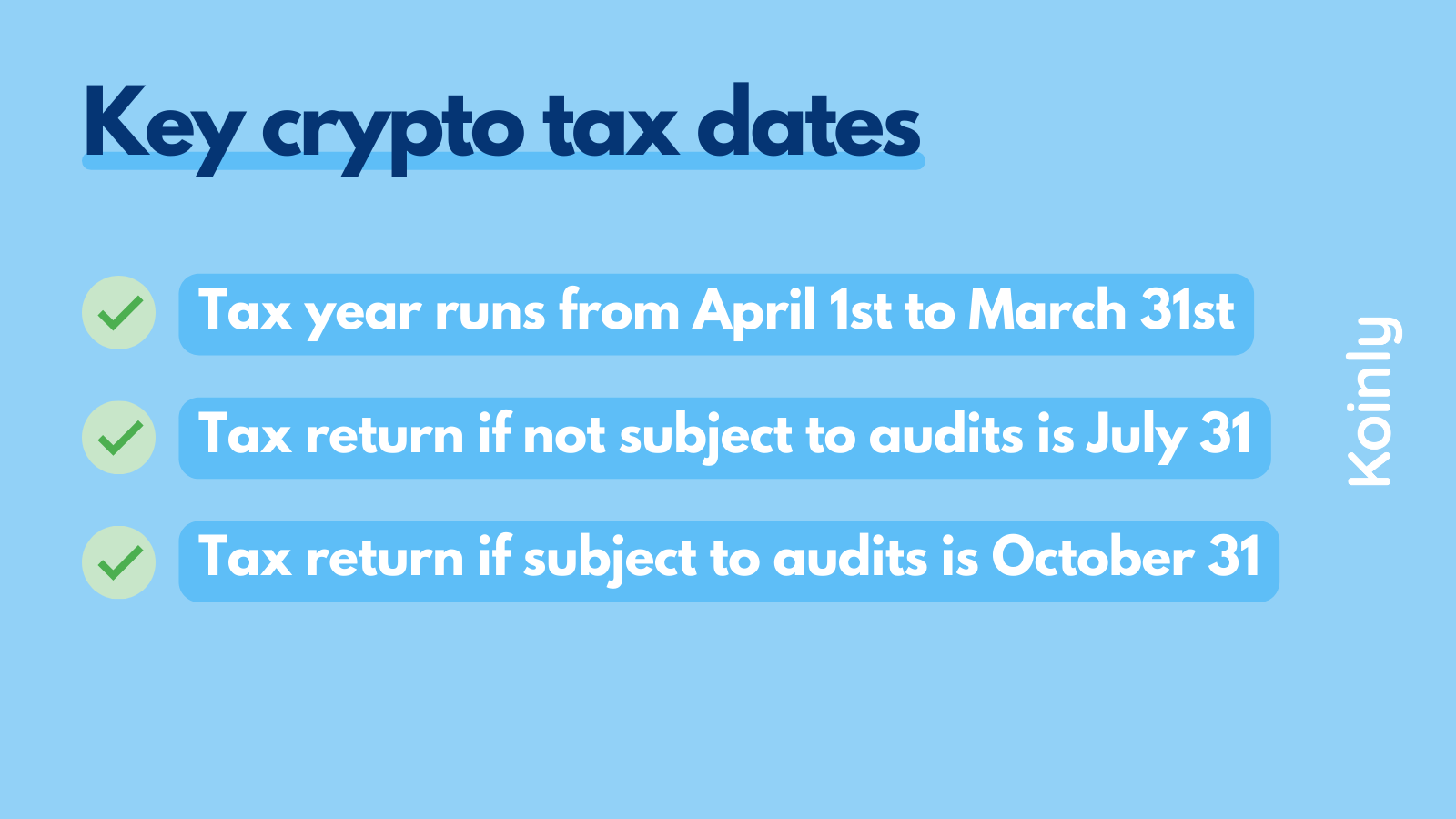Crypto Tax India: Here's How Much You'll Pay in 2024
The Income Tax Department (ITD) issued guidance on crypto tax for Indian investors making it clear that Virtual Digital Assets - including crypto, NFTs, tokens, and more - may be subject to a 30% tax, a 1% TDS, and even potentially Income Tax at your individual slab rate. We've covered everything you need to know about crypto taxes in India, including the most up-to-date guidance on Income Tax on crypto, TDS, Schedule VDA filing & more in our Ultimate India Crypto Tax Guide.
Summary:
The Finance Act 2022 was the first law to recognize Virtual Digital Assets (VDAs) in India and introduced crypto taxes.
Profits from selling, swapping, or spending VDAs - including crypto - are subject to a flat 30% tax, regardless of whether you have a short or long-term gain.
Losses from VDAs cannot be offset against profits or carried forward.
A 1% TDS is applicable to the transfer of VDAs. Exchanges may deduct this on a user's behalf, but for P2P trades or international exchanges, investors may need to deduct and deposit the 1% TDS themselves.
You may also pay Income Tax at your individual slab rate for transactions like crypto mining or staking.
Profits from crypto should be reported in the Schedule VDA in the ITR for FY 2022-2023.
Is crypto taxed in India?
Yes, cryptocurrency is subject to tax in India. In the Budget 2022, the Indian government acknowledged cryptocurrencies in India by classifying them as Virtual Digital Assets (VDAs) and introducing a taxation framework for VDAs.
How much tax do you pay on crypto in India?
You’ll pay 30% tax on profits from trading, selling, or spending crypto and a 1% TDS tax on the sale of crypto assets exceeding more than RS50,000 (RS10,000 in certain cases) in a single financial year. You may also pay Income Tax upon receipt at your individual tax rate if you’re seen to be earning other income in crypto, for example, through staking or mining.
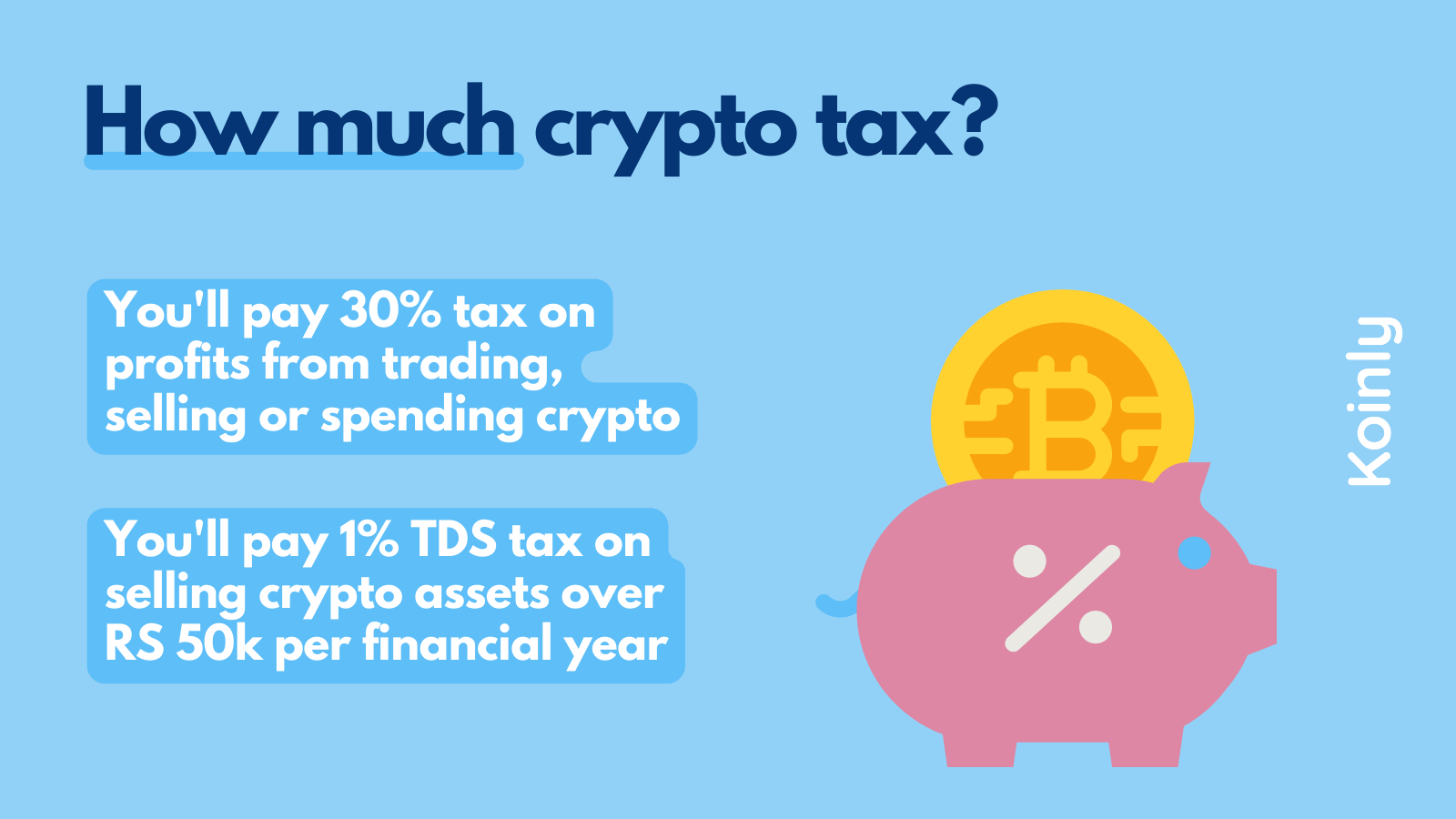
Latest updates on crypto tax in India
The Indian Government and Income Tax Department (ITD) have issued a lot of guidance about crypto and the potential tax implications of your investments over the past two years:
2023
Investors will have to declare their income from crypto and other virtual digital assets as capital gains if held as investments or as business income if held for trading purposes. Those with business income should use ITR-3, not ITR-2.
The Income Tax Return for the 2022-2023 financial year now has a dedicated section for reporting gains from crypto and other VDAs - the Schedule Virtual Digital Assets. We have an up-to-date guide on how to file with the Schedule Virtual Digital Assets Form.
Penalties are introduced for failure to deduct TDS and failure to deposit TDS in sections 271C and 276B
You must file your Income Tax Return (ITR) for FY 2023-24 by July 31st, 2024. A belated return may be filed by December 31st, 2024.
2022
Clarification on Section 115BBH is issued, stating losses incurred from VDAs - including crypto - cannot be offset against gains from other VDAs, or other income. Overall, no deduction except the cost of acquisition is allowable.
Gifting digital assets is taxable for the receiver.
The 30% tax on gains applies from April 1st, 2022. The 1% TDS applies from July 1st, 2022.
In the same Budget 2022, Section 194S is introduced, and levies a 1% TDS on purchases of cryptocurrencies if your transactions exceed RS50,000 or RS10,000 in a single financial year depending on your filing status.
In the Budget 2022, Section 115BBH is introduced, stating income from digital assets will be taxed at 30%, plus 4% cess.
Section 2(47A) is introduced to the Income Tax Act defining and categorizing Virtual Digital Assets.

How is crypto taxed in India?
The ITD introduced Section 2(47A) into the Income Tax Act to define the term Virtual Digital Assets (VDAs). The definition is detailed, but essentially covers all kinds of crypto assets including cryptocurrencies, NFTs, tokens, and more.
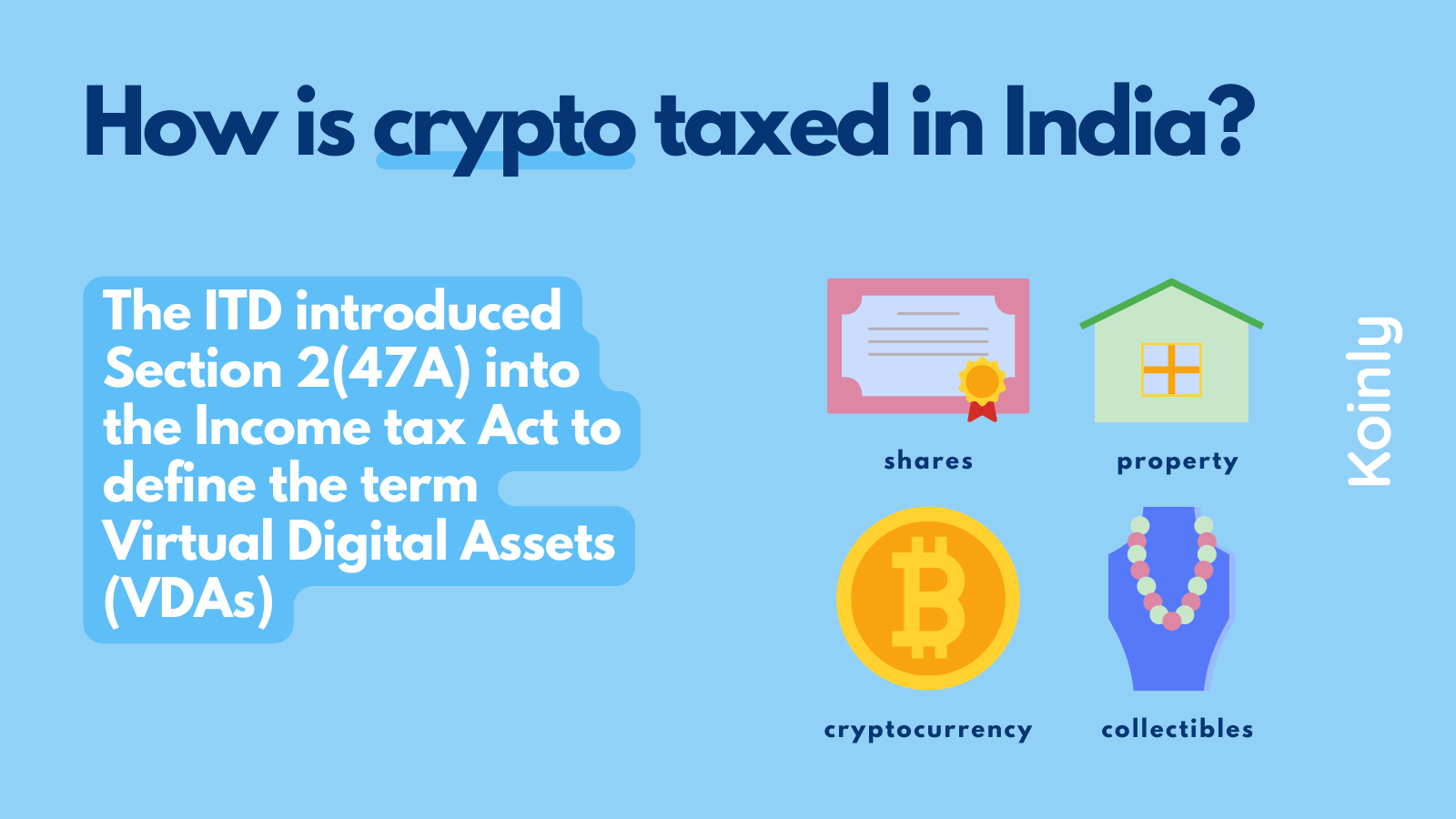 In the 2022 budget, the Finance minister introduced Section 115BBH. This section levies a 30% tax (plus applicable surcharge and 4% cess) on profits made by trading cryptocurrencies on or after April 1, 2022.
In the 2022 budget, the Finance minister introduced Section 115BBH. This section levies a 30% tax (plus applicable surcharge and 4% cess) on profits made by trading cryptocurrencies on or after April 1, 2022.
This rate is the same as India's highest Income Tax bracket (excluding surcharge and cess). The tax rate applies to private investors, commercial traders, and anyone else who transfers crypto assets in a given financial year. As well as this, the 30% tax rate will be applicable irrespective of the nature of income, so it doesn't matter if it is investment income or business income and there is no distinction between short-term and long-term gains.
The 30% tax isn't the only tax crypto is subject to. Another section, 194S, levies a 1% Tax at Source (TDS) on the transfer of crypto assets on or after July 1, 2022, if crypto transactions exceed RS50,000 in a financial year (or RS10,000 in certain cases) to ensure all crypto transactions are tracked.
Indian Investors trading in crypto/NFTs will be required to declare their income as capital gains if assets are held for investment purposes, or business income, if assets are held for trading purposes.
In the ITR for 2022-23, a new schedule specifically for reporting gains from Crypto/NFTs was introduced called Schedule - Virtual Digital Assets (VDA).
When will you pay 30% tax on crypto in India?
You may need to pay the 30% tax whenever you make the following transactions:
Selling crypto for INR or another fiat currency.
Trading crypto for crypto, including stablecoins.
Spending crypto on goods and services.
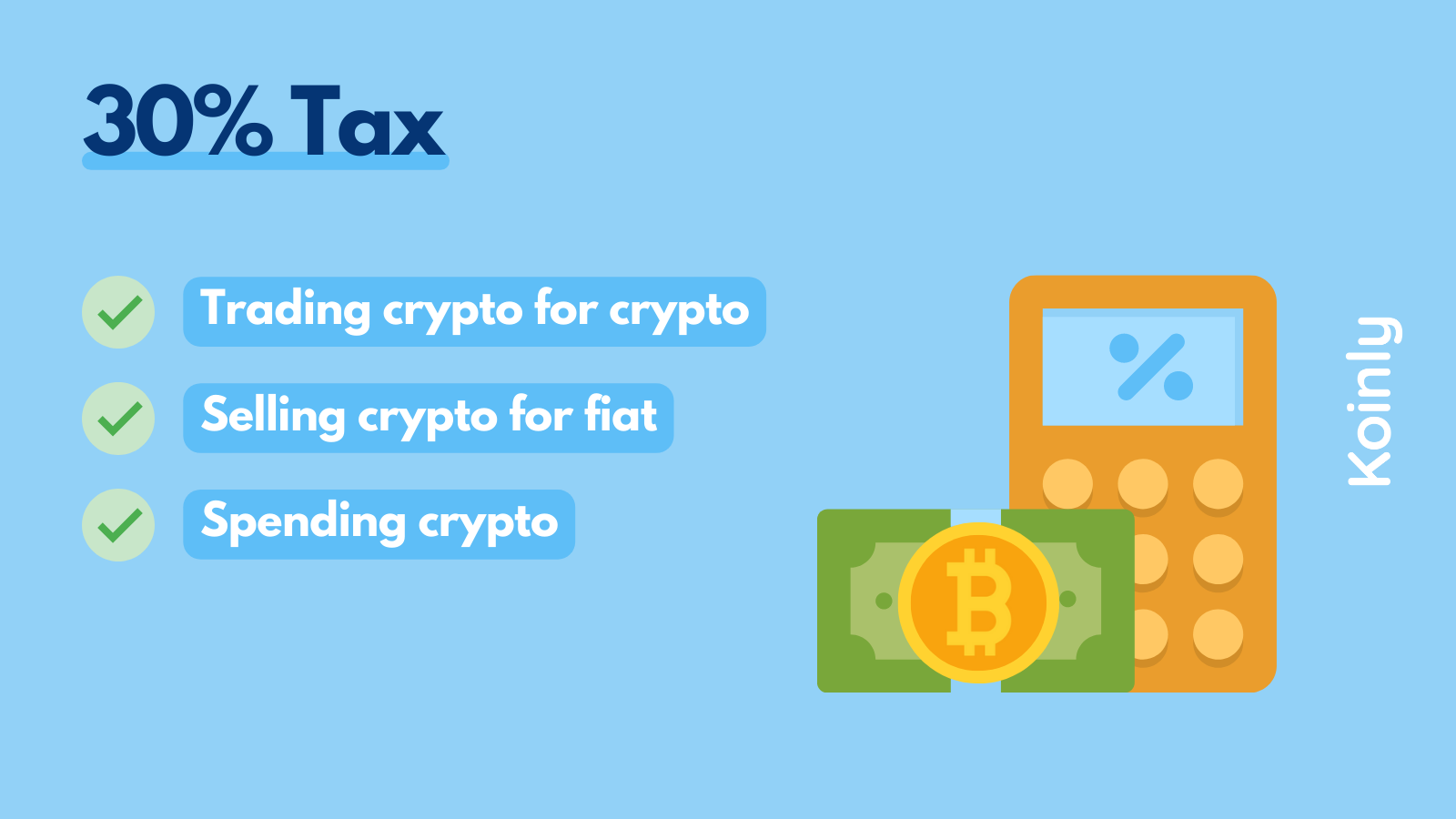 However, the 30% tax won’t always apply as sometimes the ITD will view you as having income instead. In these instances, you’ll pay tax at your Individual Tax Rate on receipt. This includes:
However, the 30% tax won’t always apply as sometimes the ITD will view you as having income instead. In these instances, you’ll pay tax at your Individual Tax Rate on receipt. This includes:
Gifting crypto - if you're the recipient of the gift (refer to the gift section for more details).
Mining coins (refer to the mining section for more details).
Getting paid in crypto.
Staking rewards.
Airdrops.
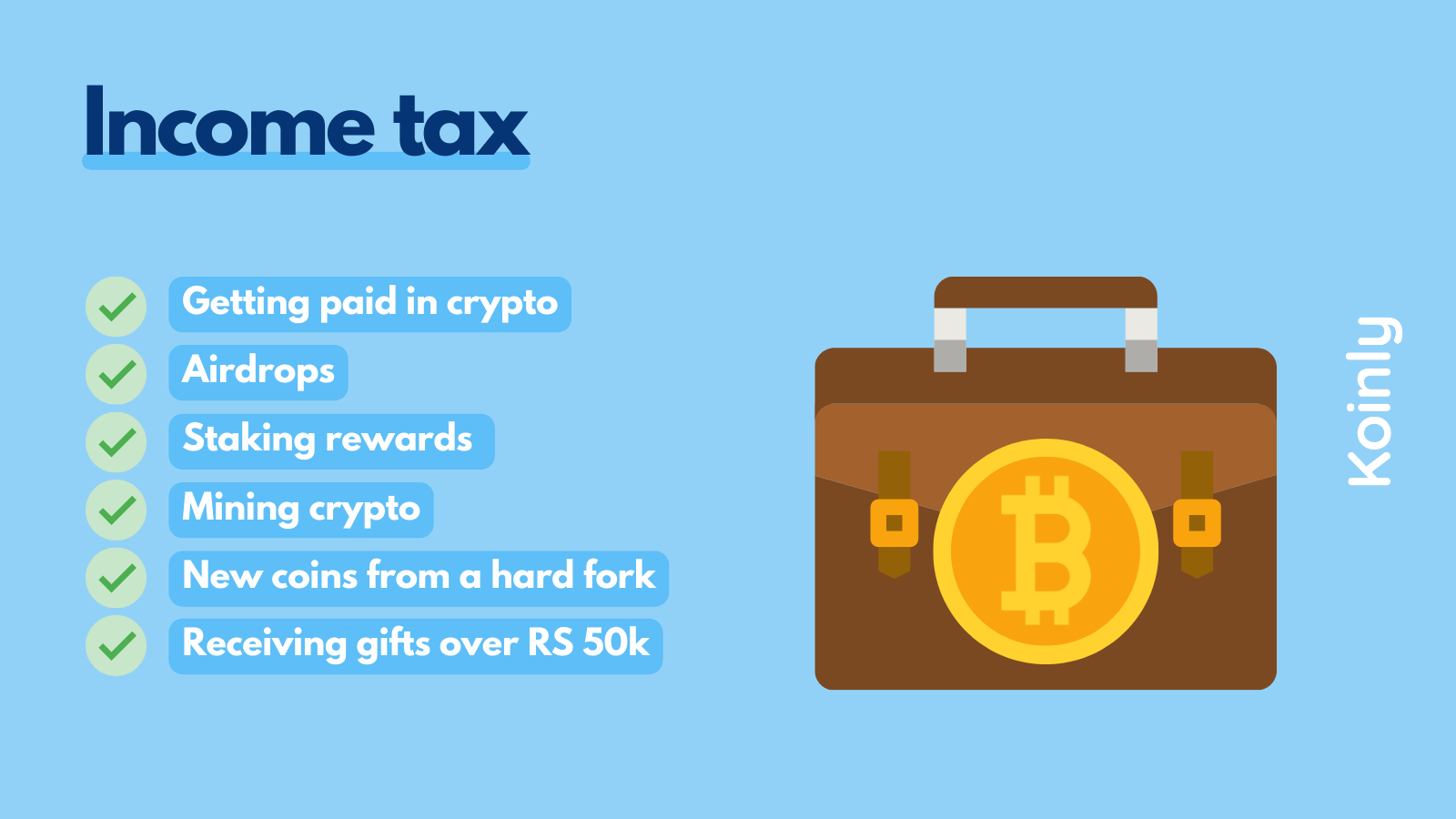 And if you later sell, trade, or spend these coins or tokens, you may be liable for the 30% tax on any profits.
And if you later sell, trade, or spend these coins or tokens, you may be liable for the 30% tax on any profits.
Individual Income Tax Slab Rates India
The Individual Income Tax Slab Rates for FY 2022-23 (AY 2023-24) are:
| Existing Tax Regime | New Tax Regime | ||
|---|---|---|---|
| Income Slab | Tax Rate | Income Slab | Tax Rate |
| Up to RS250,000 | 0% | Up to RS250,000 | 0% |
| RS250,001 - RS500,000 | 5% above RS250,000 | RS250,001 - RS500,000 | 5% above RS250,000 |
| RS500,001 - RS1,000,000 | RS12,500 + 20% above RS500,000 | RS5,00001 - RS750,000 | RS12,500 + 10% above RS500,000 |
| Above RS1,000,000 | RS112,500 + 30% above RS1,000,000 | RS750,001 - RS1,000,000 | RS37,500 + 15% above RS750,000 |
| - | - | RS1,000,001 - RS1,250,000 | RS75,000 + 20% above RS1,000,000 |
The above individual tax rates are for individual taxpayers aged less than 60 years. The tax rates mentioned above exclude applicable surcharge and 4% cess. Taxpayers may also be able to claim rebates under Section 87A of up to RS12,500 if income is up to RS500,000.
For the latest Income Tax rates please refer to the government guidance.
As well as all of the above, there are many potential tax implications from DeFi activities.
DeFi income
The ITD has not released specific guidance on DeFi transactions. Instead, we need to refer to the existing provisions of the Income Tax Act for guidance. The following DeFi transactions may be taxed at your Individual Tax Rate upon receipt:
Earning new liquidity mining tokens, governance, or reward tokens
Referral rewards
Play to earn income
Browse to earn platforms like Permission.io or Brave
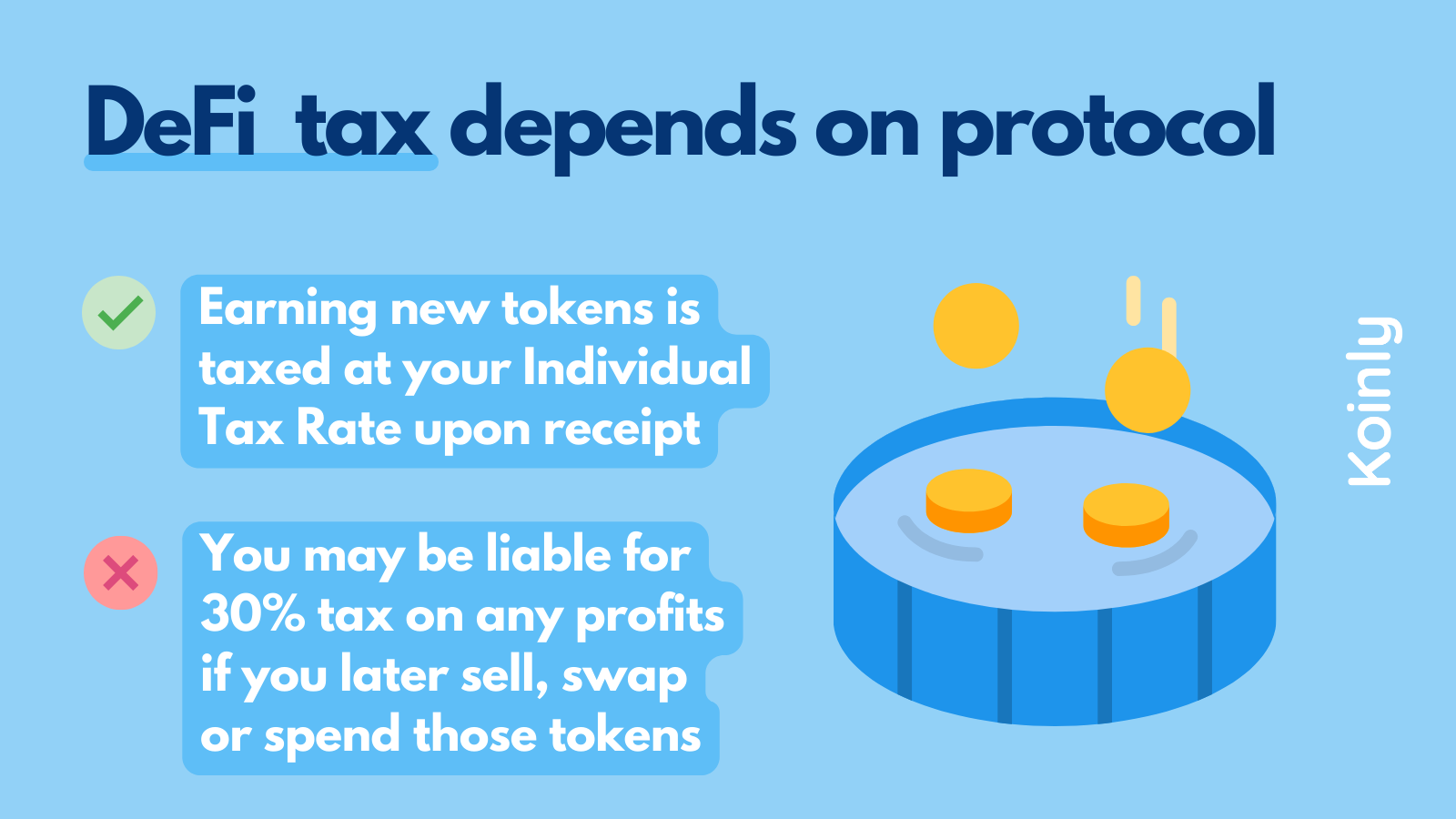 And even though you’ve paid tax upon receipt, don’t forget you may be liable for 30% tax on any profits if you later sell, swap or spend those tokens.
And even though you’ve paid tax upon receipt, don’t forget you may be liable for 30% tax on any profits if you later sell, swap or spend those tokens.
What is the 1% TDS on crypto assets?
You’ll pay a 1% TDS on the transfer of a crypto asset. TDS is a form of tax collected at the source. The primary reason the 1% TDS has been introduced is to capture transaction details and keep track of investments being made in crypto assets by Indian Investors.
Despite the confusing language from the ITD, transfer means a change of ownership, so a sale, trade, or spend - not transferring from one wallet to another.
There are a couple of important points to note on crypto TDS:
The 1% TDS applies to transactions from the 1st of July 2022.
When trading on Indian exchanges - TDS will be deducted by exchanges and deposited with the government.
When trading through P2P platforms or international exchanges - the buyer is liable to deduct TDS.
In the case of crypto-to-crypto trades, TDS will be applied to both buyer and seller at 1%.
To further complicate things, no TDS is required to be deducted if consideration is payable by a “specified person” and the total value of their crypto trading activities does not exceed RS50,000 in a single financial year.
What is a specified person?
A specified person refers to an individual or HUF (Hindu Undivided Family). The TDS limit of RS50,000 reduces to RS10,000 for taxpayers other than a specified person, if:
You have sales/gross receipts/business income up to RS1 Crore or no income from business in the previous financial year.
You have sales/gross receipts/professional income up to RS50 Lakhs or no professional income in the previous financial year.
If you're trading on Indian exchanges - your TDS requirements will generally be fulfilled by the exchange itself, so you don't need to do anything. However, in the case of P2P and transactions on international exchanges, when it comes to paying and filing TDS as a specified person:
You’re required to submit TDS in Form 26QE within 30 days from the end of the month in which TDS is deducted in case of P2P and transactions on International exchanges. This form is currently not yet available for filing on the income tax portal. Hence investors will need to wait for clarity from ITD on how to deposit the TDS.
All taxpayers other than a specified person are required to obtain TAN, submit a return in Form 26Q on a quarterly basis, and make TDS payment by the 7th of next month. It is advisable to obtain the help of a qualified tax expert if you are required to file Form 26Q
As well as this, you can reduce your total tax payable by claiming a TDS credit when filing your tax return.
Example
Arun bought 1 Bitcoin for RS1,000,000 and sold it for RS800,000.
The exchange Arun bought BTC on deducted TDS of RS8,000.
Arun has a loss of RS200,000, and as a result, no tax is due. When he files his tax return, he can claim a refund of RS8,000 TDS.
New penalties for avoiding TDS
Crypto Investors in India were dealt a major blow when the Indian government announced severe measures against traders not complying with the TDS rules.
As per the new provision, non-deduction and payment of TDS to the government can lead to not only 100% of the TDS amount as penalties but in certain cases may also lead to imprisonment for a period of 3 months to 7 years plus a fine. Let’s look at the legislation with examples in detail.
Section 271C: Penalty for failure to deduct 1% TDS
If any taxpayer fails to deduct TDS, they may pay a penalty equal to the amount of TDS due levied by the Joint Commissioner.
Example
Arun had purchased RS100,000 of Bitcoin. As per Section 194S, he was required to deduct 1% TDS before making payment to the seller.
If Arun fails to deduct 1% of RS100,000, so RS1,000 as TDS, and deposit it with the government then Arun may be liable for a penalty equal to RS1,000 as levied by the Joint Commissioner.
Section 276B: Failure to pay TDS to Government
Any taxpayer who fails to pay TDS to the government may face imprisonment for a period of 3 months to 7 years! The fine and imprisonment are levied by the court of law on an application by the Income Tax Department with prior approval of the Joint Commissioner.
Read next: What are the penalties for tax evasion in India?
Example
Arun had purchased RS100,000 of Bitcoin. As per Section 194S, he was required to deduct 1% TDS before making payment to the seller.
If Arun deducted 1% TDS of RS100,000, so RS1,000 as TDS but failed to deposit it with the government, Arun may face a jail term of 3 months to 7 years and a fine.
Crypto losses
It's bad news for investors when it comes to losses from crypto investments. Section 115BBH prohibits offsetting crypto losses against crypto gains or any other gains or income for that matter.
Indian crypto investors are also not allowed to claim crypto-related expenses except the cost of acquisition/buy price.
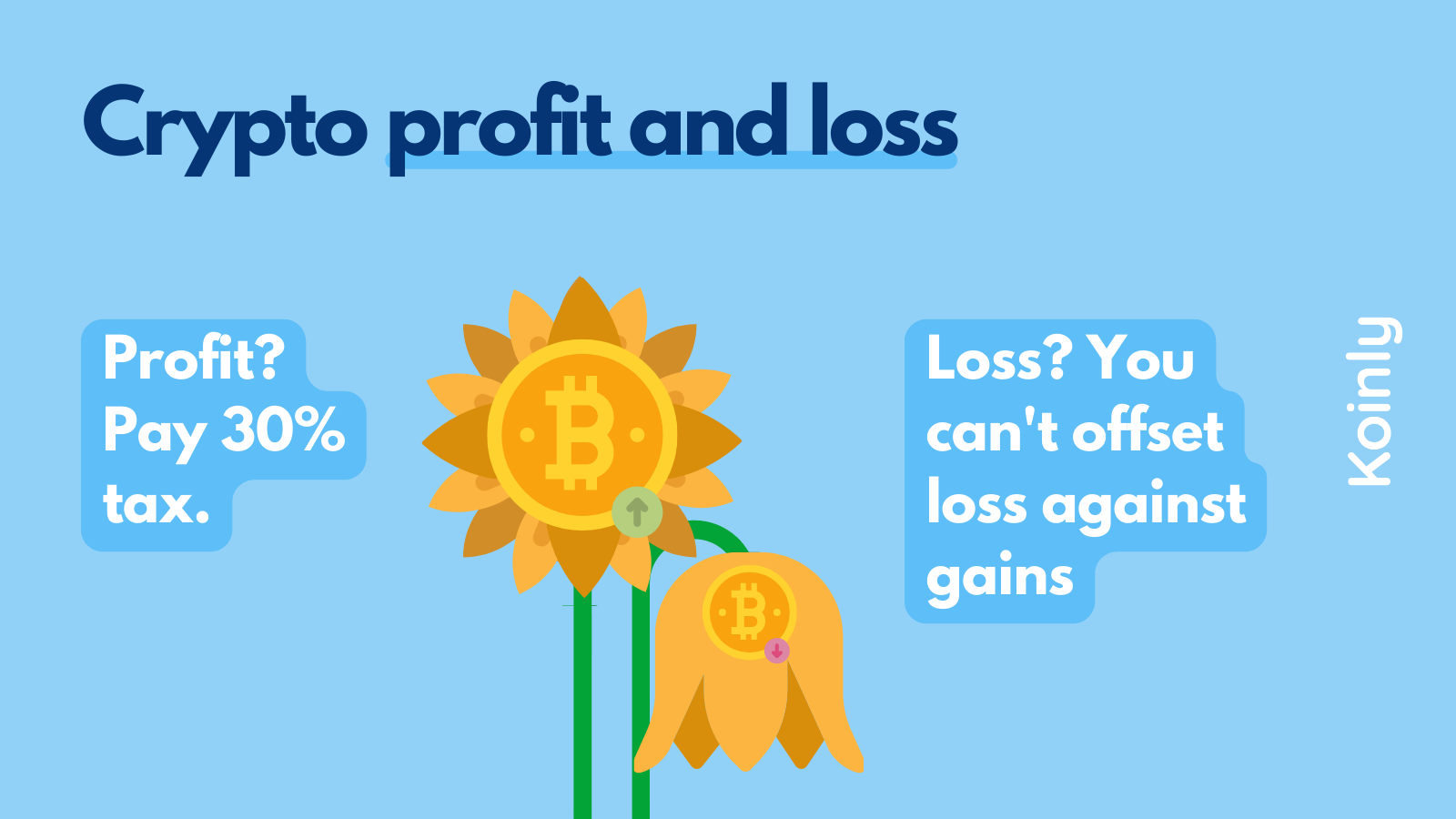
Example
Ahaan bought 1 BTC for RS1,000,000 and sold it for RS800,000. Ahaan also bought RS800,000 ETH and sold it for RS900,000.
The exchange Ahaan used deducted RS17,000 TDS and charged a trading fee of RS7,000.
Ahaan has a loss of RS200,000 from BTC and a gain of RS100,000 from ETH. Section 115BBH does not allow Ahaan to offset his loss from BTC, or deduct his trading fees.
Therefore, Ahaan pays 30% tax on his RS100,000 profit, or RS30,000. He may also claim a TDS credit of RS17,000. Overall, Ahaan will need to pay RS13,000 as balance tax when he files his tax return.
Is any crypto tax free in India?
You won't pay tax on every crypto transaction. Transferring crypto between your own wallets and holding crypto is tax free in India. As well as this, receiving a gift of crypto from close family members and receiving a gift of crypto under RS50,000 from friends and relatives is tax free.
In summary, you won't pay tax on your crypto in India when you're:
HODLing crypto.
Transferring crypto between your own wallets
Receiving a gift of crypto up to RS50,000 from friends and relatives
Receiving a gift of crypto of any amount from close family members
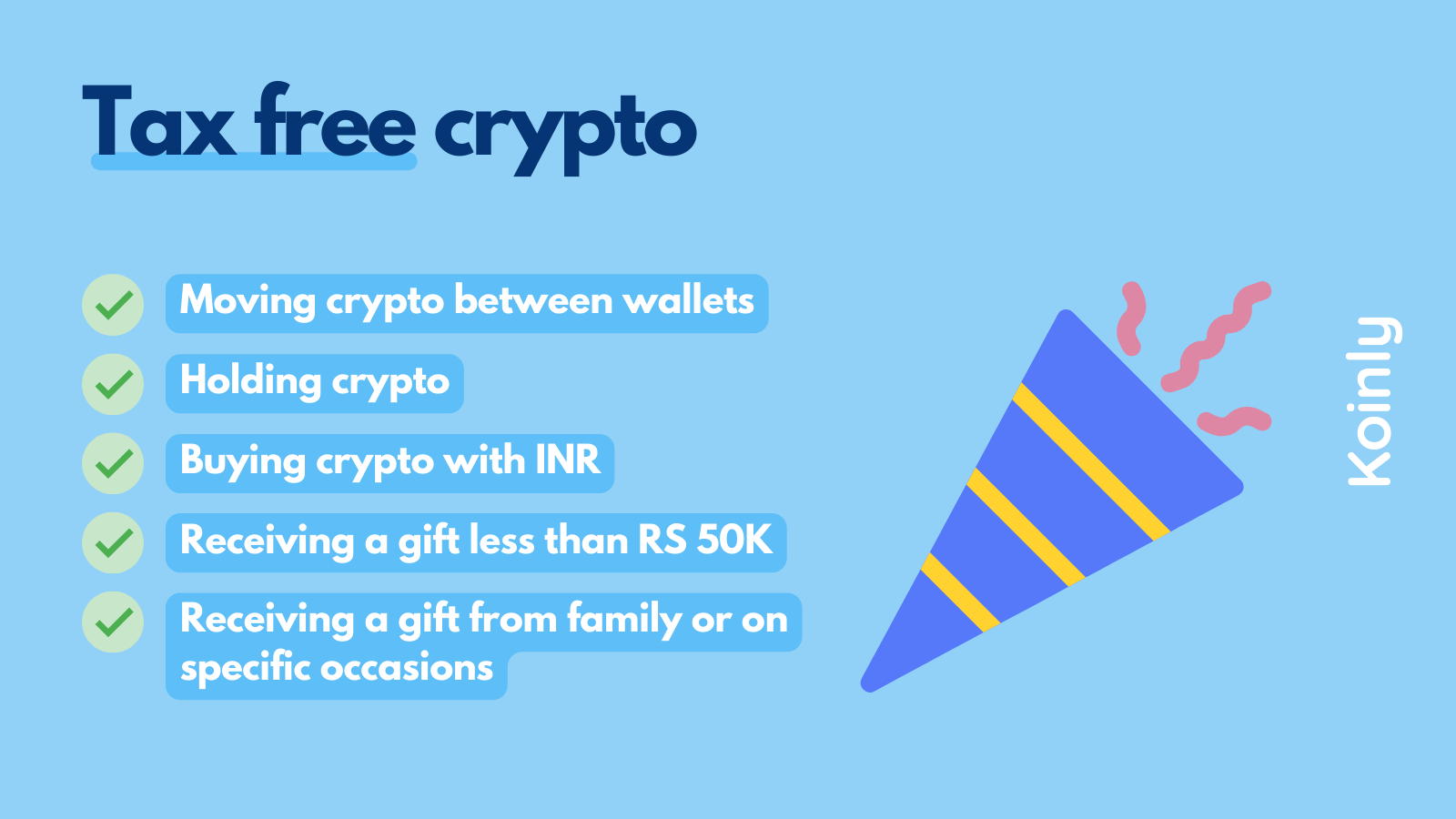
Lost or stolen crypto in India
The ITD has not offered clear guidance on lost and stolen crypto. But based on various judgments passed by Indian courts on loss/theft of other kinds of assets, there is no tax payable on the crypto lost as a result of a hack, scam, or theft.
However, given the ITD’s harsh stance on offsetting crypto losses against gains, it’s very unlikely investors could claim and offset a loss from a lost/stolen crypto asset.
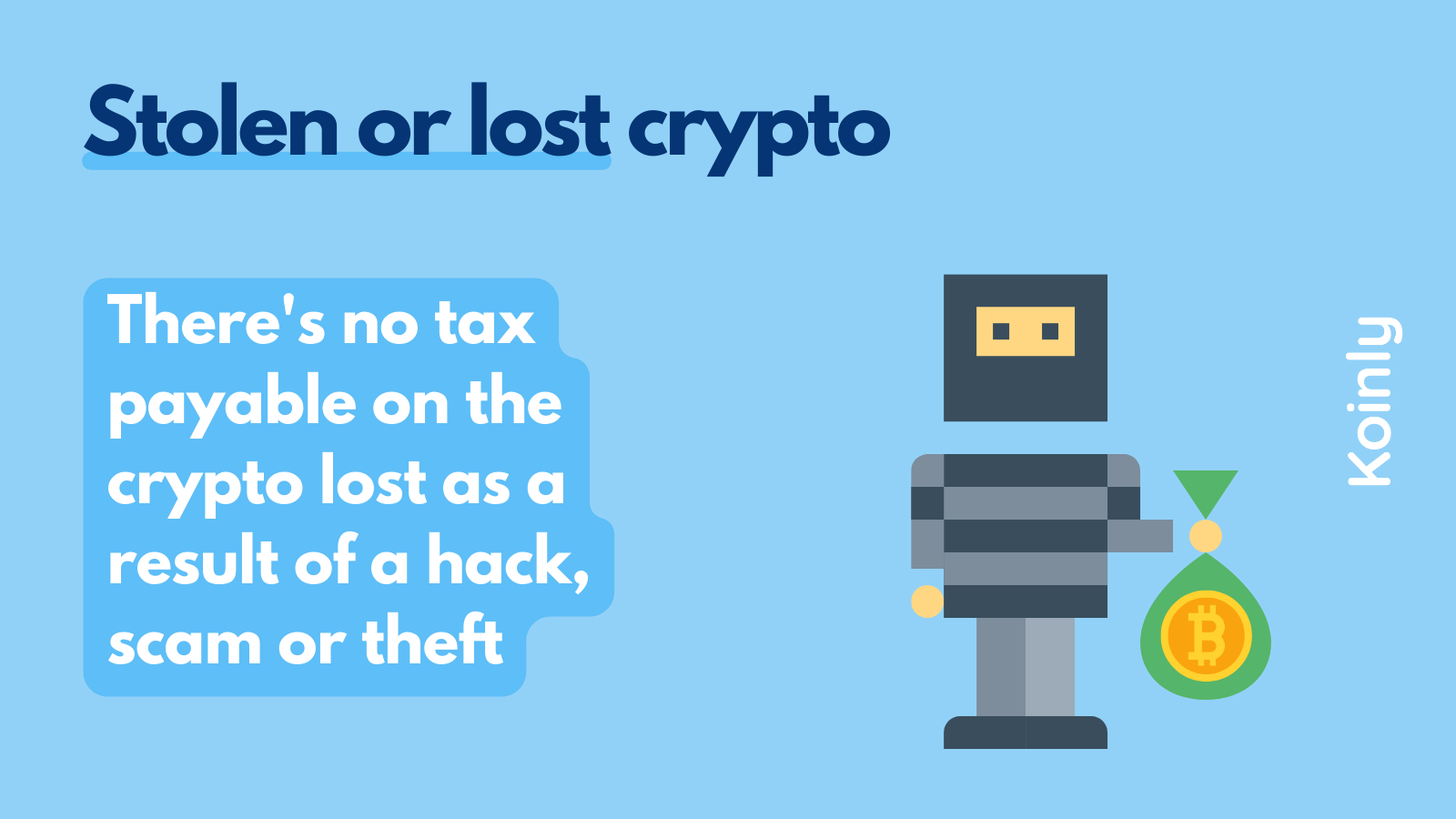
How are gifts of crypto taxed?
Generally speaking, you'll pay tax when you receive a gift of crypto - unless it's from a specific person(s) or under a certain amount. Gifts of crypto from close family members are tax free, and gifts under RS50,000 from friends and relatives are tax free.
If you receive a gift of crypto - whether that's coins, tokens, or an NFT - you'll generally be liable to pay Income Tax at your applicable slab rate, based on the fair market value of your gift.
This said, there are a couple of exceptions when you won't pay tax when receiving a crypto gift:
Gifts made from close family members (parents, spouse, siblings of taxpayer and spouse, lineal ascendant or descendant of taxpayer and spouse) are not taxed on receipt.
Gifts less than RS50,000 in a single financial year are not taxed on receipt.
Gifts received as a result of a marriage or via inheritance are not taxed on receipt.
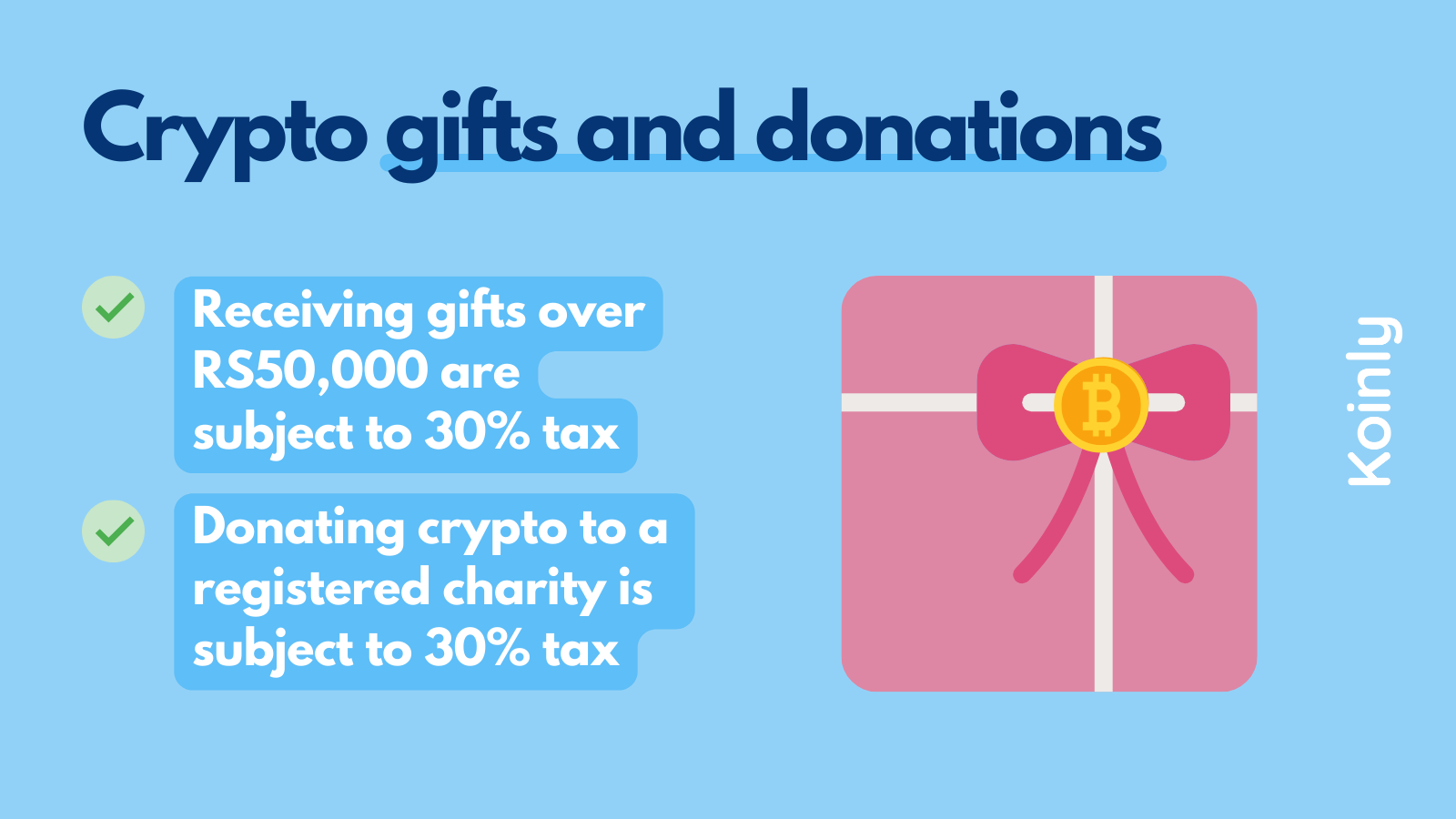
Examples
Sanjay receives RS10,000 in BTC from his father. Neither Sanjay nor his father needs to pay tax.
Sanjay receives RS10,000 in BTC from a friend. Neither Sanjay nor his friend needs to pay tax as it is not over the RS50,000 gift allowance per financial year.
Sanjay receives RS60,000 in BTC from a friend. This is more than the RS50,000 allowance and therefore Sanjay will need to pay tax upon receipt, but his friend does not.
Sanjay receives RS10,000 BTC from a friend as a wedding gift. Neither Sanjay nor his friend needs to pay tax as wedding gifts are not taxed.
How to calculate tax on crypto
You know you'll pay a flat 30% tax on your profits, but how do you calculate your profits? You need to start by figuring out your cost basis.
Your cost basis is how much it cost you to buy your crypto, or the fair market value in INR of the crypto on the day you received it. Unlike most other tax offices, the ITD does not allow you to add things like buy or sell fees to your cost basis.

Crypto cost basis method India
Of course, most investors aren’t calculating a gain or loss from a single asset, they're actually calculating gains and losses for multiple crypto assets which makes tracking your cost basis a lot trickier. A cost basis method dictates which assets you sold and when - which can have a big effect on your gains and losses. In general, India recognizes the first in, first out (FIFO) and average cost basis accounting methods.
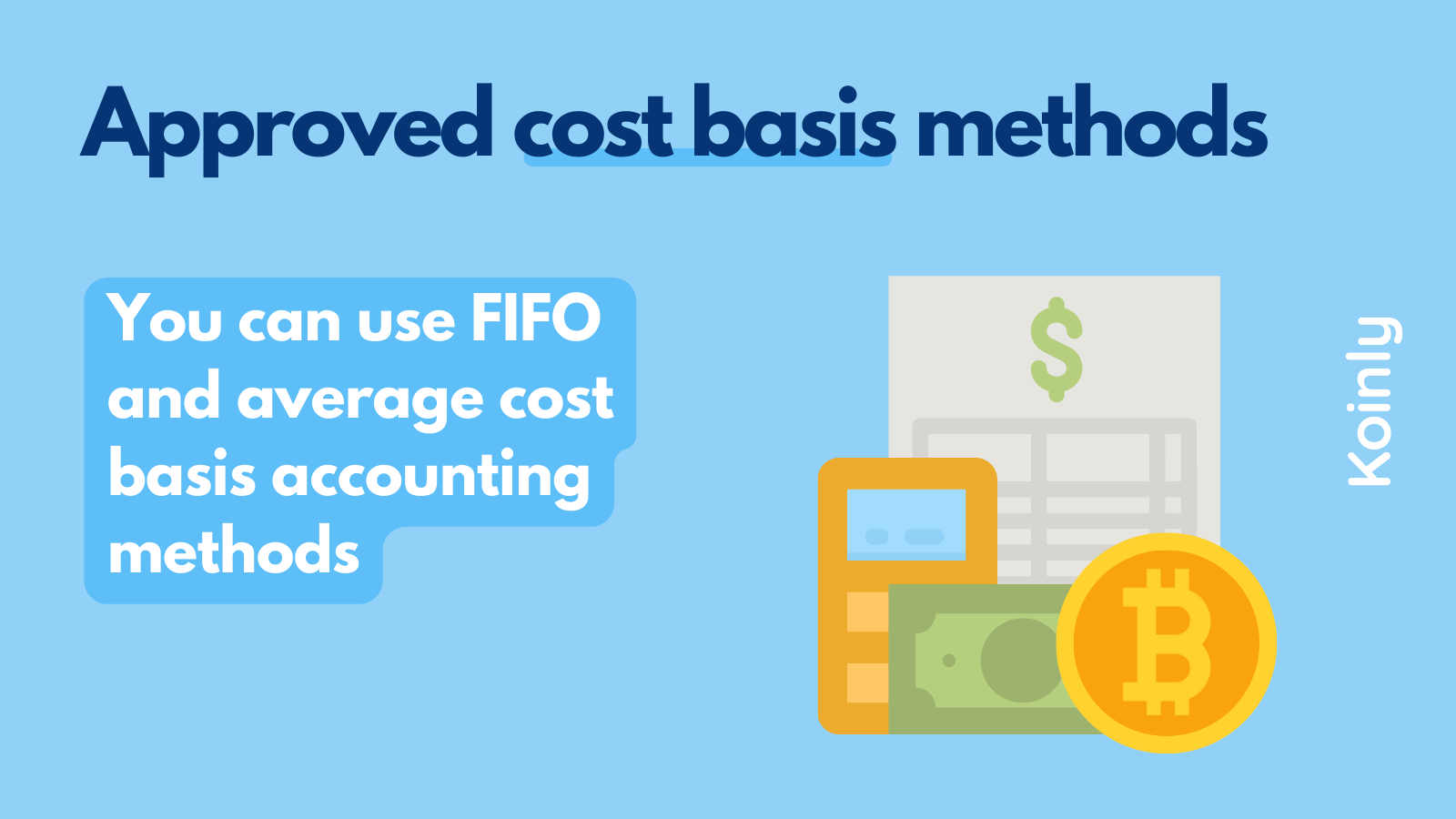
With the fundamentals out the way, let's take a look at a number of common transactions and the kind of tax that may apply.
Which crypto transactions are subject to tax?
Wondering which transactions are taxed and which tax applies? Check out our handy table of transactions, or look at our many examples below to help you understand in-depth.
| Transaction | Tax |
|---|---|
| Buying crypto | 1% TDS, usually deducted by the exchange (excluding international & P2P trades) |
| Selling crypto | 30% tax on any gain |
| Trading crypto for crypto | 30% tax on any gain |
| Spending crypto | 30% tax on any gain |
| Holding crypto | Tax free |
| Moving crypto between your own wallets | Tax free |
| Airdrops of crypto | Income Tax at your individual tax rate, 30% tax if you later sell |
| Hard forks | Income Tax at your individual tax rate on receipt, 30% tax if you later sell |
| Gifts of crypto | Recipient is generally taxed, with some exceptions for gifts from close family or under RS50,000 |
| Donating crypto | Only cash donations are tax deductible, any perceived profits may be subject to 30% tax |
| Mining rewards | Income Tax at your individual tax rate, 30% tax if you later sell |
| Staking rewards | Income Tax at your individual tax rate, 30% tax if you later sell |
Do you pay tax when you buy crypto in India?
You don't currently pay tax when you buy crypto with fiat currency like INR. However, if you are purchasing crypto through a P2P platform or international exchanges, you will be required to deduct 1% TDS, file the TDS return, and remit the balance amount to the seller’s account.
Buying crypto with INR
1% TDS1% TDS applies to purchases of crypto. If you're using an Indian exchange, this is deducted and deposited automatically on your behalf.
However, if you're purchasing crypto through a P2P or international platform, the buyer is liable to deduct and deposit TDS.
HODLing crypto
TAX FREEWaiting for the moon? Great plan and great news for your taxes. You'll pay no tax on crypto you HODL.
Again, do make sure to keep records of how much it cost you to acquire your crypto so you can accurately calculate your capital gains and losses later on.
For those long-term HODLers, it may be worth using a platform that tracks and stores trading information for long periods of time, as exchanges often only keep information for 3 to 6 months. This information can then easily be imported into Koinly to quickly find out how big your tax liability is.
Trading crypto for crypto
30% TAXYou’ll pay 30% tax on any profits from a crypto to crypto trade.
To calculate your capital gain, you'd use the cost base of the crypto you disposed of and subtract it from the fair market value for that asset on the day you traded it for another crypto.
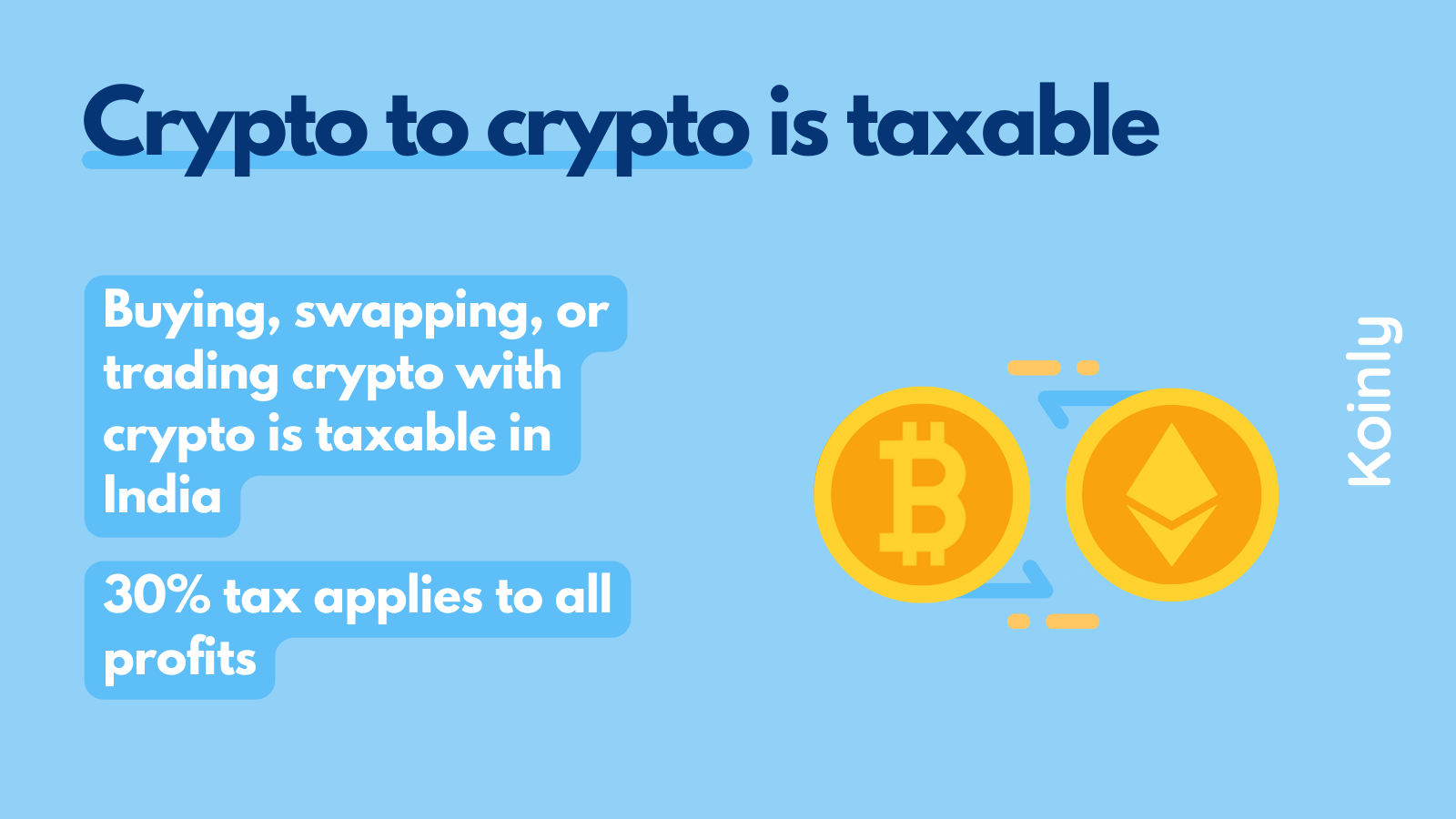
Buying crypto with stablecoins
30% TAXStablecoins are cryptocurrencies that are pegged to a reserve currency, often a fiat currency. For example, the cryptocurrency USDT is tethered to the US dollar. This allows for reduced price volatility.
Buying crypto with stablecoins is viewed as trading crypto for crypto, so any profits are subject to a 30% tax.
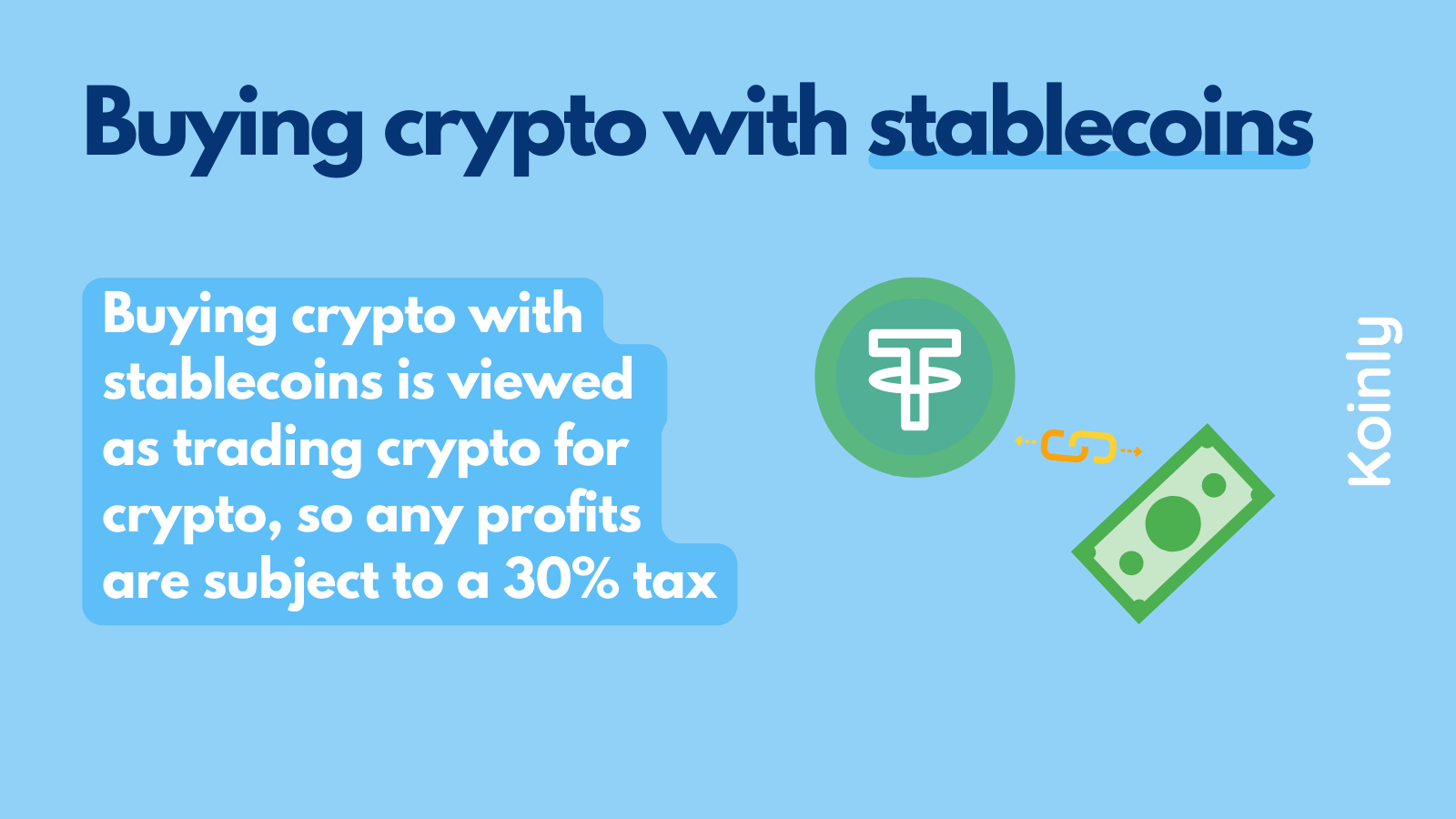
Do you pay tax when you sell cryptocurrency in India?
Yes. If you have a capital gain from selling crypto for fiat currency like INR, you'll pay a 30% tax on that gain. This also applies if you trade one cryptocurrency for another.
Selling crypto for fiat currency
30% TAX & 1% TDSAny profits from selling crypto for fiat currency like INR are subject to a 30% tax rate. You'll also have a 1%TDS deducted by Indian crypto exchanges, or by the buyer in the case of P2P and international platforms.
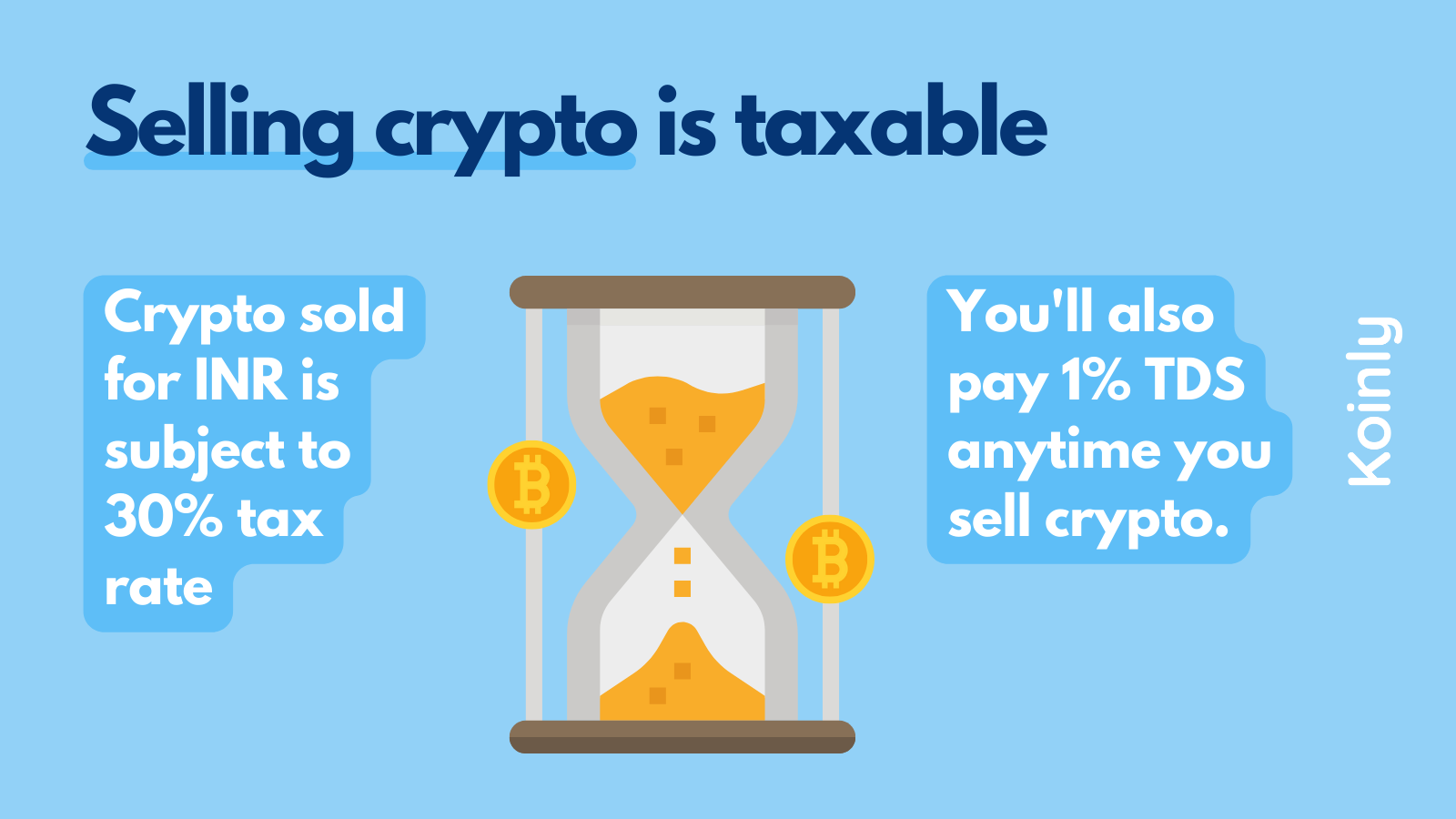
Selling crypto for crypto
30% TAX & 1% TDSProfits from trading one crypto for another are subject to 30% tax, as well as a 1% TDS for the seller.
Do you pay tax when transferring crypto?
Despite the confusing terminology from the ITD, you won’t pay tax when you transfer crypto between your own wallets.
Moving crypto between wallets
TAX FREEYou won’t pay tax when you transfer crypto between your own wallets. Your crypto does not exchange ownership - so despite the confusing terminology from the ITD, there is no 'transfer of VDA' when transferring crypto between wallets.
Example
Aadhya had 1 BTC in her Binance account. She transferred it to her CoinDCX account.
This is not a transfer of crypto assets since the transactions are between Aadhya's own wallets. As such, no tax is payable.
How are airdrops and forks taxed in India?
Airdrops and forks are similar to receiving gifts, as such, they may be taxed upon receipt and disposal.
New coins from a hard fork
INCOME TAXFor soft forks, you'll receive no new assets, so there is no taxable event.
For hard forks, where you receive a new coin as a result of a fork, you’ll pay Income Tax at your individual rate based on the fair market value of the tokens in INR on the day you receive them.
If you later sell, swap, or spend your coins, you’ll be liable to pay 30% tax on any profit as a result of the transaction.
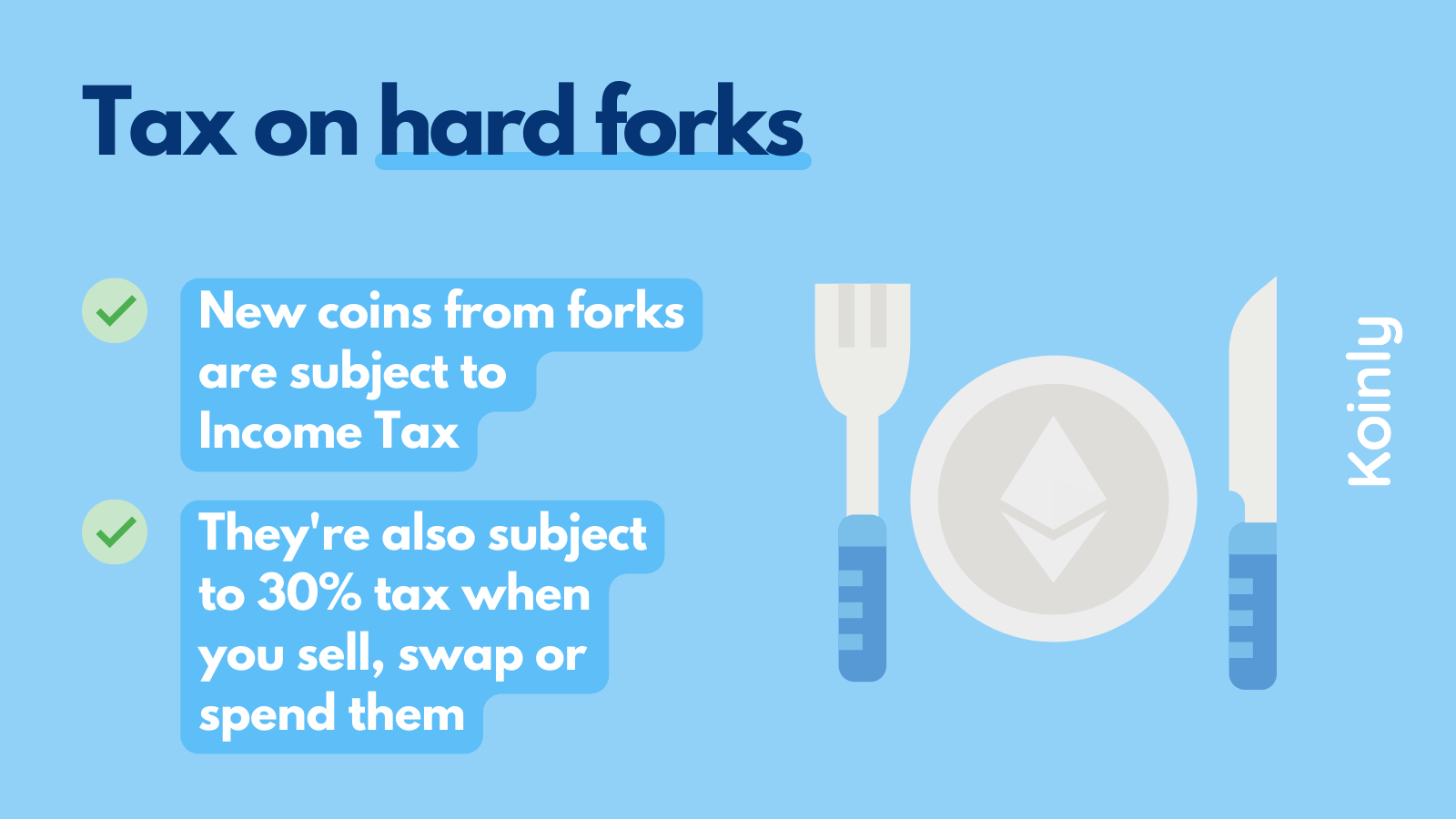
Receiving an airdrop
INCOME TAXReceiving an airdrop is similar to receiving a gift. As such, you’ll pay Income Tax at your individual rate based on the fair market value of the token upon receipt.
You can calculate how much income you have by identifying the fair market value of the tokens on the day you received them in INR.
It is important to note that since Airdrops are considered a gift, you may be able to claim tax exemption if the value of airdrops & gifts is up to RS50,000 in a year.
Example
Hari holds 100 NEO tokens. On April 1, 2022, Hari receives 10 GAS tokens. On that day the fair market value of GAS tokens is RS10.
Hari will be liable to pay tax at his slab rate on the GAS tokens he received, so he'll pay Income Tax on RS100.
Selling or swapping coins from an airdrop
30% TAXThe bad news keeps on coming. Not only will you pay Income Tax when you receive an airdrop, but you'll pay 30% tax when you later sell, swap, or spend the coins or tokens you received from an airdrop - if there's a profit.
Your cost basis for airdrops is the fair market value on the day you received them in INR.
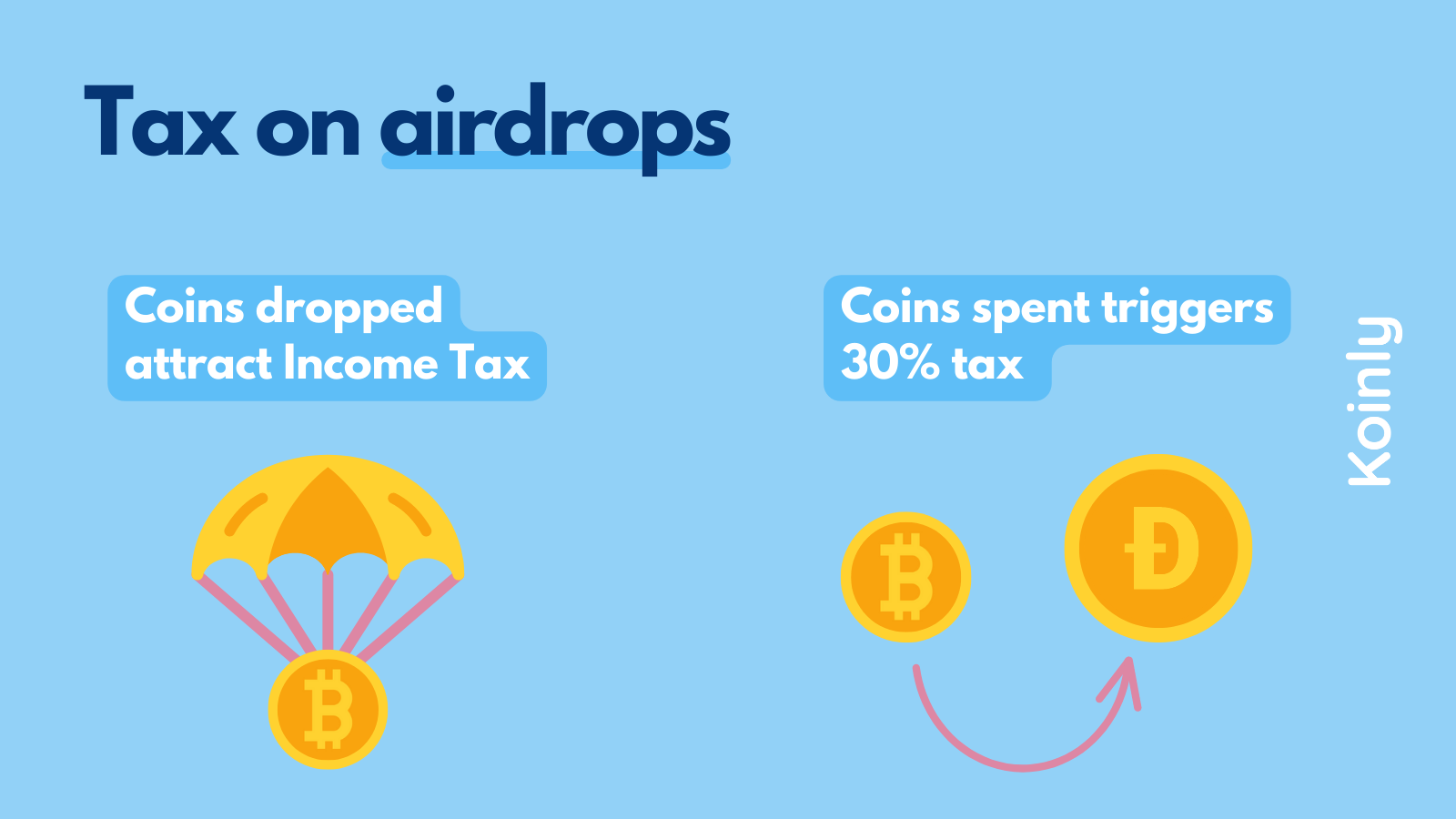
Example
Let's use the example above again. We know Hari held 100 NEO tokens, and received 10 GAS tokens valued at RS100 on the day he received them, which he has already paid Income Tax on.
Hari later sells his 10 GAS tokens for RS200. To calculate his gain, subtract the fair market value of the GAS tokens on the day he received them from his sale price
RS200 - RS100 = RS100. Hari will pay 30% tax on RS100.
Crypto gifts and donations tax
Gifting crypto in India is taxed - although there are a couple of exceptions if you give under a certain amount within a year or if you gift to friends and family members for specific occasions like as a wedding gift. It's important to note it isn't the person giving the gift that is liable for tax, but the recipient
Receiving a gift less than RS50,000
TAX FREEReceiving a gift less than RS50,000 in a financial year is tax free.
Receiving a gift from family
TAX FREEUnder India's current gift tax laws, gifts from immediate family members - for example, from your parents or siblings - are tax free.
Receiving a gift on specific occasions
TAX FREEThere are certain occasions or circumstances when receiving a gift from outside your immediate family is tax free. This includes as a wedding gift or via an inheritance or will.
Receiving a gift more than RS50,000
INCOME TAXIf you receive a gift of crypto worth more than RS50,000 in a single financial year, you'll be liable for Income Tax at your applicable slab rate on that gift.
Donating crypto to a registered charity
30% TAXA tax deduction for donations to charitable institutions can only be claimed if the donation is made through banking channels or in cash up to RS2,000.
As crypto is not a legal tender in India, donations will not be tax deductible. In fact, your generous act will likely be treated as a disposal of an asset and any perceived profits are subject to 30% tax.
How is crypto mining taxed in India?
The ITD has not released dedicated guidance on crypto mining tax yet. But it's likely the ITD may consider this additional income. As such, you'll pay Income Tax at your individual rate based on the fair market value of your crypto in INR. If you later sell, swap, or spend your mining rewards and make a gain, you'll also be liable to pay a 30% tax on that gain.
Crypto mining
INCOME TAXYou’ll pay Income Tax at your individual rate based on the fair market value of mined coins in INR on the day you receive them.
Worse still, if you later sell, swap, or spend mined coins, you’ll also be liable for 30% tax on any profit.
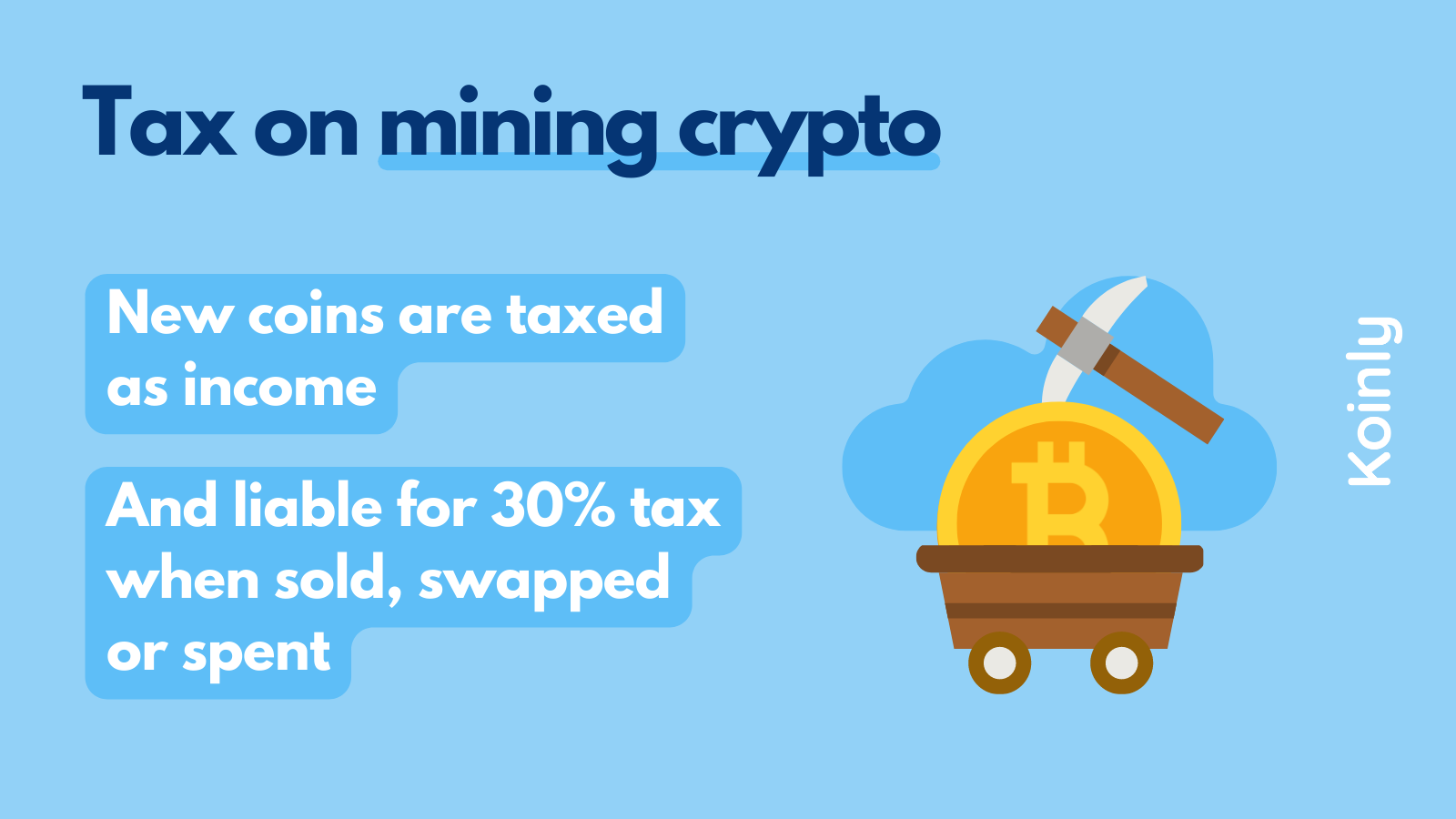 As there is no clarity from the ITD, we'd recommend consulting an experienced accountant on the potential tax implications of crypto mining activities.
As there is no clarity from the ITD, we'd recommend consulting an experienced accountant on the potential tax implications of crypto mining activities.
How is crypto staking taxed in India?
The ITD has not released dedicated guidance on crypto staking tax yet, but it's likely the ITD may consider this additional income. As such, you'll pay Income Tax at your individual rate based on the fair market value of your crypto in INR. If you later sell, swap, or spend your staking rewards and make a gain, you'll also be liable to pay a 30% tax on that gain.
Crypto staking
INCOME TAXAgain, the ITD hasn't released any guidance on staking rewards and the tax implications yet. But it's likely if you're staking as part of a PoS consensus mechanism, you'll need to pay Income Tax at your individual rate upon receipt of staking rewards based on the fair market value in INR on the day you receive tokens.
You will also be liable for 30% tax on any profit when you later sell, swap, or spend your staking rewards.
Is there GST on cryptocurrency in India?
The Indian government has not yet clarified how, if at all, GST may apply to crypto. Currently, the GST Act does not define or refer to VDAs. However, it is only the supplier of goods who should levy and collect GST. The largest Indian crypto exchanges are currently seeking clarification on the applicability of GST for crypto assets.
When do I need to report crypto taxes to the ITD?
The financial year (FY) in India runs from April 1st to March 31st the following year. You'll report all your income - including from crypto - for this period by July 31st. If you're undergoing an audit, this deadline is extended until October 31.
For example, the most recent financial year is April 1st, 2023 to March 31st, 2024 (FY 2024-24). This will be the financial year you'll be reporting on when you file your taxes this year. The deadline to file taxes for taxpayers not subject to audits is July 31, 2024. For taxpayers undergoing an audit, the deadline is October 31, 2024. A belated return may be filed by December 31, 2024.
How do you file your crypto taxes with the ITD?
You'll file your crypto taxes for FY 2023-24 (AY 2024-25) using the Income Tax Form ITR-2 (reporting as capital gains) or ITR-3 (reporting as Business Income).
The ITR-2 and ITR-3 forms have a dedicated space to report crypto gains or income. You'll report your crypto profits under “Schedule VDA” in the tax return. You can see the steps on how to report & pay your crypto tax in India in our guide - including screenshots of how to file with the new Schedule VDA.
Binance India, CoinDCX, WazirX, and more...
Koinly is the leading cryptocurrency tax calculator in India and pairs with the leading Indian crypto exchanges to make crypto tax less taxing. Whether you're using Binance India, CoinDCX, WazirX - or all three - Koinly can help. Koinly pairs with more than 700 exchanges, wallets, and blockchains via API or CSV. All you need to do is connect your exchange to Koinly using API or upload a CSV file of your transaction history and Koinly does the rest for you, calculating your taxes in minutes and saving you hours.
Read next: Learn how to buy cryptocurrency in India with our 3 step guide
How to calculate taxes on cryptocurrency
Calculating your crypto taxes so you can report them - especially if you trade at volume - is time-consuming. You can do it all manually, or you can use a crypto tax calculator like Koinly to save you hours. Here's how easy it is:
1. Sign up for a FREE Koinly account
It only takes a minute!
2. Select your base country and currency
In this instance, India and INR.
3. Select your accounting method
Koinly supports many cost basis methods. FIFO is the default and permitted by the ITD.
4. Connect Koinly to your wallets, exchanges, or blockchains
Koinly integrates with more than 300 crypto exchanges, wallets, and blockchains. (See all) If you can't find yours, let us know - we're always adding more.
5. Let Koinly crunch the numbers. Make a coffee.
Koinly will calculate your cost basis for each crypto asset like ETH, ADA, Bitcoin, and many more. Koinly will calculate each capital gain or loss from your disposals, as well as your crypto income and expenses.
6. Ta-da! Your data is collected and your full tax report is generated!
Head to the tax reports page in Koinly and check out your tax summary.
7. To download your crypto tax report, upgrade to a paid plan.
Download what you need, when you need it, with plans starting from RS490.
8. Send your report to your chartered accountant
Use the generated file to complete your Income Tax Return or send it over to your accountant. Job done.
Can the Income Tax Department (ITD) track crypto?
Yes. The ITD uses KYC information provided by Indian exchanges, as well as the 1% TDS, to track your crypto holdings.
The ITD can request crypto exchanges to share KYC (know your customer) data to ensure tax compliance. As well as this, the 1% TDS makes it much easier for the ITD to track each individual taxpayer's assets.
The penalties for tax evasion in India - including evasion of TDS - are severe. Tax evasion is a criminal offense in India and the penalties range from steep fines to imprisonment depending on the severity.
Your frequently asked questions
More questions about cryptocurrencies in India? We have you covered.
Is Bitcoin legal in India?
Yes. Bitcoin is legal in India, although the government has created a particularly hostile environment for investors and businesses with the Budget 2022 guidance on crypto taxation.
What’s the cryptocurrency bill in India?
The ITD introduced Section 2(47A) into the Income Tax Act to define the term Virtual Digital Assets (VDAs) and then introduced Section 115BBH in the Budget 2022, which levies a 30% tax on profits from trading cryptocurrencies, and 194S, which levies a 1% TDS on purchases of cryptocurrencies. In the Budget 2023, a new Schedule for Virtual Digital Assets was introduced to the ITR forms to help investors report their cryptocurrencies to the ITD.
Will I pay Income Tax on cryptocurrency?
You might pay Income Tax at your individual slab rate if you have specified transactions likely to be considered additional income - for example, mining and staking rewards or airdrops of crypto.
Is crypto trading legal in India?
Yes. Crypto trading is legal in India. Day traders may need to declare that they have business income as opposed to capital gains.
What’s the 30% tax on crypto and VDAs?
The 30% tax on crypto applies to any profit you make from selling, swapping, or spending crypto. This applies to all Virtual Digital Assets including coins, tokens, NFTs, stablecoins, and more.
Can I offset crypto losses against gains from crypto in India?
No. Section 115BBH prohibits offsetting crypto losses against crypto gains, or any other gains or income for that matter. It's a harsh stance from the ITD.
What is the crypto TDS date?
The 1% TDS on crypto applies from July 1, 2022. As well as this, the 30% tax on crypto gains applies from April 1, 2022.
Can I claim crypto TDS?
If you've deposited TDS with the ITD throughout the financial year, you can claim a tax credit for the deducted amount in your tax return.
Is there a crypto tax calculator for India?
Yes! Koinly is the best India crypto tax calculator. You can try Koinly completely free of charge to calculate your crypto gains, losses, and income today.
Is India banning crypto?
No. There is no indication currently from the Indian government that it plans to ban crypto. However, the crypto tax guidance under the Budget 2022 and Budget 2023 has created a rather hostile regulatory environment for Indian crypto investors.
Which India crypto exchanges deduct TDS?
In order to operate in India legally, all Indian exchanges must deduct and deposit TDS on behalf of their users. You can find out more in our best Indian crypto exchanges guide.
How do I avoid tax on cryptocurrency in India?
You can't avoid tax on cryptocurrency in India legally - and you shouldn't try to. The penalties for tax evasion are steep, with fines of up to 200% and prison sentences of up to 7 years!
How can Koinly help with my crypto taxes in India?
Koinly is a crypto tax calculator that helps you calculate your gains, losses, income, and more so when the tax deadline rolls around, all you need to do is download your Koinly tax report and file your ITR online or hand your report over to your accountant. Best of all, Koinly is completely free to use - you'll only ever pay if you upgrade to a paid plan starting from only RS490.


